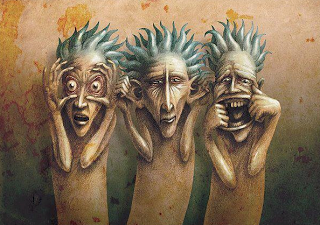Abhijith Jayanthi's Blog, page 3
May 24, 2014
Unfounded Meaning of Secularism in India
 I wish to begin this post by exploring the basic meaning of Secularism. Secularism is the principle of the separation of government institutions and persons mandated to represent the state from religious institutions and religious dignitaries. One manifestation of Secularism is asserting the right to be free from religious rule and teachings, or, in a state declared to be neutral on matters of belief, from the imposition by government of religion or religious practices upon its people. Another manifestation of Secularism is the view that public activities and decisions, especially political ones, should be uninfluenced by religious beliefs and/or practices. Secularism draws its intellectual roots from Greek and Roman philosophers such as Marcus Aurelius and Epicurus; from Enlightenment thinkers such as Denis Diderot, Voltaire, Baruch Spinoza, James Madison, Thomas Jefferson, and Thomas Paine; and from more recent freethinkers and atheists such as Robert Ingersoll and Bertrand Russell.The purposes and arguments in support of Secularism vary widely. In European laicism, it has been argued that Secularism is a movement toward modernization, and away from traditional religious values (also known as secularization). This type of Secularism, on a social or philosophical level, has often occurred while maintaining an official state church or other state support of religion. In the United States, some argue that state Secularism has served to a greater extent to protect religion and the religious from governmental interference, while Secularism on a social level is less prevalent. Within countries as well, differing political movements supportSecularism for varying reasons. The term Secularismstands conveniently abused by many a learnt member of the Indian Polity. Although the term was new, the general notion of free thought on which it was based had existed throughout history. While in India, the term assumed a rather sorry state of use. Anything and everything related to a specific religion i.e. Hinduism and thoughts related thereof were propagated to be non-secular while holding thoughts in line with other religions were not included in such a definition – absurd abuse of position by political masters and intellectual retards, to say the least. The term Secularismshould have been used to describe a class of political views that promote a social order separate from religion, without actively dismissing or criticizing religious belief. While at it, if we were to look at the Indian Political Landscape, most of the Political Parties which profess religious views and seek to represent a certain section of the society will have to be termed Non-Secular. It is important that we understand that Secularism is not an argument against any religion, it is one independent of it. It does not question the pretensions of any religion or faith; rather it helps separate the State from Religion, thus fostering general wellbeing. Secularism does not say there is no light or guidance elsewhere, but maintains that there is light and guidance in secular truth, whose conditions and sanctions exist independently, and act forever. Few confused hard-line Secularists seek to advocate religious propositions related to particular faith/religion to be epistemologically illegitimate, warranted by neither reason nor experience, thus fostering support for other religions. It is imperative to understand that movement away/towards a particular religion does not necessarily constitute Secularism. I hope to see the new breed of Politicians in India are well-educated and understand the true essence of what Secularism stands for. - Abhijith JayanthiPlace: Hong Kong
I wish to begin this post by exploring the basic meaning of Secularism. Secularism is the principle of the separation of government institutions and persons mandated to represent the state from religious institutions and religious dignitaries. One manifestation of Secularism is asserting the right to be free from religious rule and teachings, or, in a state declared to be neutral on matters of belief, from the imposition by government of religion or religious practices upon its people. Another manifestation of Secularism is the view that public activities and decisions, especially political ones, should be uninfluenced by religious beliefs and/or practices. Secularism draws its intellectual roots from Greek and Roman philosophers such as Marcus Aurelius and Epicurus; from Enlightenment thinkers such as Denis Diderot, Voltaire, Baruch Spinoza, James Madison, Thomas Jefferson, and Thomas Paine; and from more recent freethinkers and atheists such as Robert Ingersoll and Bertrand Russell.The purposes and arguments in support of Secularism vary widely. In European laicism, it has been argued that Secularism is a movement toward modernization, and away from traditional religious values (also known as secularization). This type of Secularism, on a social or philosophical level, has often occurred while maintaining an official state church or other state support of religion. In the United States, some argue that state Secularism has served to a greater extent to protect religion and the religious from governmental interference, while Secularism on a social level is less prevalent. Within countries as well, differing political movements supportSecularism for varying reasons. The term Secularismstands conveniently abused by many a learnt member of the Indian Polity. Although the term was new, the general notion of free thought on which it was based had existed throughout history. While in India, the term assumed a rather sorry state of use. Anything and everything related to a specific religion i.e. Hinduism and thoughts related thereof were propagated to be non-secular while holding thoughts in line with other religions were not included in such a definition – absurd abuse of position by political masters and intellectual retards, to say the least. The term Secularismshould have been used to describe a class of political views that promote a social order separate from religion, without actively dismissing or criticizing religious belief. While at it, if we were to look at the Indian Political Landscape, most of the Political Parties which profess religious views and seek to represent a certain section of the society will have to be termed Non-Secular. It is important that we understand that Secularism is not an argument against any religion, it is one independent of it. It does not question the pretensions of any religion or faith; rather it helps separate the State from Religion, thus fostering general wellbeing. Secularism does not say there is no light or guidance elsewhere, but maintains that there is light and guidance in secular truth, whose conditions and sanctions exist independently, and act forever. Few confused hard-line Secularists seek to advocate religious propositions related to particular faith/religion to be epistemologically illegitimate, warranted by neither reason nor experience, thus fostering support for other religions. It is imperative to understand that movement away/towards a particular religion does not necessarily constitute Secularism. I hope to see the new breed of Politicians in India are well-educated and understand the true essence of what Secularism stands for. - Abhijith JayanthiPlace: Hong KongDate: 16th May 2014

Published on May 24, 2014 11:10
April 1, 2014
Successful Entrepreneur: Scuttling Through Life
 I begin this article as a critic of entrepreneurship – I am concerned about the implications that historiography has for reading into an entrepreneur's journey who lived through the events of growth. The enormity of the intellectual displacement which one experiences during the journey is difficult to comprehend. The constant sense of thought transitions and urgency to conquer related to the possibility of tasting success continue to occur every single day.
I begin this article as a critic of entrepreneurship – I am concerned about the implications that historiography has for reading into an entrepreneur's journey who lived through the events of growth. The enormity of the intellectual displacement which one experiences during the journey is difficult to comprehend. The constant sense of thought transitions and urgency to conquer related to the possibility of tasting success continue to occur every single day.By the time the transitions are finally over, possibly zillion of ideas and methods have had crossed the newly created boundaries of growth trajectory – that everyone willfully define in their Business Plans, carrying with them memories of a kind of internal conflict that one fights with his/her own immediate surroundings, people in his/her life. The journey appears to be frighteningly commonplace with repeated occurrences and the displaced individual called entrepreneur will respond to calls of his our journey and also that of his community – sometimes involving violence, threat to their survival, security for the future, and cultural continuity including finding a companion in life.
During this conflux of emotional servitude, most of the entrepreneurs succumb, thousands of them separated from their families and communities – resigning to the fate of failure, not able to handle the pressures of negative recognition. What qualifies as the 'rightful' success story is for this world to decide and sing praises about, but seldom do we celebrate failure. Something is fundamentally wrong with the particular construction of an entrepreneur’s identity in our country – one that shall not honor their experiences and I implore everyone to appreciate, for there are multitude of examples showcasing the concept of rejection agency in and through literary and historical narratives of the 'everyday' stories of entrepreneurship.

I am reminded of a Haryanvi Couplet which aptly showcases the struggle that an entrepreneur needs to go through – for a sense of identity and accomplishment: Aur yeh beti jise tum saath mere kankthiyon se dekhte ho Beshumar haathon ne loota hai ise.
(And this daughter, whom you observe out of the corner of your eyes, sitting by my side - how many have looted her?)
The narrator of the poem represents the identity of his daughter as a possession to be looted. His rhetorical question, "How many have looted her" is embedded with a societal ideology that marks an entrepreneur's identities and their efforts as symbols of community honor and 'tradition' and makes them a subject of everyone’s judgment. Seldom does one see beyond the obvious – and understand there is a huge struggle to get to this stage – where one is at present. It takes more than learning about an entrepreneur’s journey, to truly appreciate their efforts.
- Abhijith Jayanthi

Published on April 01, 2014 10:59
February 19, 2014
The Final Frontier

The question that is vexing policy makers and analysts alike worldwide is climate change — is sending jitters across the World. One of the ripple effects, is food security, crisis thereof. India has not yet experienced riots over rising food prices linked to inflation that have hit other countries like Zimbabwe or Argentina – if an added effect of climate change is added to this, it is a worrying signal. In the capital, Delhi, milk costs 11% more than last year. Edible oil prices have climbed by a whopping 40% over the same period. More crucially, rice prices have risen by 20% and prices of certain lentils by 18%. Rice and lentils comprise the staple diet for many Indians.
With a rapidly deteriorating climate condition and lack of consensus with regard to way forward, food security situation in India – a country with over billion people is a definite cause for concern, not only for Indian policy-makers but also other economies, considering earning/spending capacities impact global consumption in general. We are dangerously close to the final frontier and we will need to appreciate the fact that with the changing world, the chances that we will see a shift in terms of climate and environment around us is immense while at the same time, whether such a change is for the better is in doubt.
- - Abhijith
P.S.: The image displayed here is an award winning poster on Global Warming

Published on February 19, 2014 11:16
January 9, 2014
The Indian Democratic Experiment: On the Brink of Failure

In the recent years, let’s face it – Dr. Manmohan Singh has pulled down the standards. As a result of which scores of people, both ordinary citizenry with extraordinary belief in self, and extraordinary members of industry with ordinary acumen otherwise have begun their evening stroll in the garden of Indian democracy. This is a dangerous signal for the health of democracy, and I intend to discuss the pros and cons of it in this article.
Firstly, it is remarkable to appreciate the active involvement of the citizenry – given their will and necessity, stemming from ever increasing inflation, and lack of employment opportunities. They represent the ill-informed, but passionate countrymen, filled with energy and are seeking a change, to sell their faith and loyalties to. On the other side, we have (wo)men of repute in their particular industries/lines of work – with stagnant career progression curves and negligible connect with ground realities otherwise sensing an opportunity to take the plunge, as a natural next step. There is an eminent danger that the former set of population fall prey to the latter set because of their overt packaging of selves. Ultimately, due to lack of innovation in terms of governance – considering the latter set is devoid of such intellectual faculties, except for transitioning into a new role on their career progression graphs; old set of policy measures and governance methods are bound to continue.
Given the limited acumen but bloated egos of the latter, national development that has sustained considerable damage in the recent past, will broaden creating a great divide – pushing the country towards civil war. International funds and investors (referred to in this articles as funders) will re-align their priorities to tackle this broader divide, as reflected in the 2008 - 2012 FDI Drain, pushing the economy further down.
It must be remembered in that connection that equality and democracy are not synonymous in spite of the fact that these two terms are frequently confounded in "democracies" with an aristocratic-liberal historical background. Numerical majorities are not necessarily keen to preserve equality in a democracy; considering the demand for equality (and related privileges in terms of treatment and subsidies) always arose from select minorities – leading to appeasement schemes. Genuinely "democratic" societies can be brutally cruel to those who dare to be "different" in an unconventional way.
Our evaluation and adaptation methodology needs to be updated to reflect more systematically the broader inclusion, rather than pursuing a change of leadership – at least without adequate political training. Enterprising in Public life has become the new trend, and is exceeding enterprising innovation in private sector. This will create continued pressure on treasury, with ill-informed choices and decisions – putting the economy at further risk. This will culminate in failure of the Indian democracy experiment.
- Abhijith Jayanthi

Published on January 09, 2014 22:28
December 27, 2013
Attitude Change: New Indian Democracy

Attitude Change is undoubtedly an impending reality for political landscape in India. Though primarily perceived as a short-term game plan during election seasons, addressing expectations is also a developmental economics issue involving enormous costs. In this context, addressing attitude change is a common challenge for traditional political parties, which so far, were operating without openness in policy framework. Its impact is already being seen in different forms: be it unprecedented electoral response in State Government Elections of Delhi, effects on how the business is conducted – be it agriculture, fisheries and health, and already scarce forest, land, and water resources. With changes in key variables, namely average age of population, earning capacity, exposure to and aspirations for better standard of living, it is in our collective interest that our country moves towards an attitude resilient development path.
The important question here is how to grow fast while keeping in mind the need for poverty eradication, managing urbanization, and improving public health, education and development. As a developing country, India strongly believes that it requires adequate development space for its people.
I am only reiterating the fact that attitude change is a real issue and like every serious concern it also entails some inevitable trade-offs and choices that are to be made as a part of the planning exercise when malicious agencies will want to get involved in the name of change within the competing demands of a vibrant political franchise. Lately with the growing concerns about attitude change, the set of trade-offs faced by traditional policy makers and dependent lobby agencies has expanded, with critical decisions to be made regarding meeting expectations.
On the flip side, poorer sections of the society are demanding more space, in order to achieve the same level of per capita income and welfare as enjoyed by the rich in the country. There is a huge lacuna in terms of bringing their attitude and aspirations’ divide amongst these sections - can also be perceived as developmental divide. For India in the short and medium run dependence on bringing this gap will continue to be a necessary part of enabling growth.
The choice between focussing on purely growth centric processes or adopting an ambitious attitude correction trajectory were never easy to make and are going to be even more difficult in the coming years. As growth weakens, growth becomes more of priority; it will become difficult for attitude change to sustain itself.
The central question then will remain: How do we finance all of our needs, while staying within a prudent attitude envelope? The answer has to be more efficient spending and polices to generate equitable and inclusive growth, along with additional efforts to constantly monitor the definition of the same as we move forward.
The need of the hour is also to create strong incentives to encourage civil society participation in democracy. The political market will need to be transformed to attract for more participation and reduce nepotistic despondency.
Given the constraint on resources, ultimately the entire task boils down to optimal resource allocation and mobilization and also the creation of an incentive structure that motivates citizenry appropriately. The role that markets and development/ non-government organizations can play in this task is significant. New and additional resources through the participatory mechanism of our vibrant democracy will play a crucial role in handling this attitude change.

Published on December 27, 2013 00:42
June 18, 2013
Sleeping Good Tonight

There is no doubt we are living longer than
ever before, and because of this more and more people are making an effort to
take better care of themselves so that they can be healthier and sharper and
thus maintain a better quality of life. Naturally, with an extended life span,
we all want to maintain our cognitive abilities as long as we can. Brain games
are undoubtedly popular tools for staying sharp, but they are only one of many
in the arsenal of cognitive maintenance.
Mental stimulation is an absolute necessary
for keeping the brain sharp because it helps to generate new brain cells as
well as create new connections between existing nerve cells. Cognitive
activities like math games, word puzzles and reading, and physical activities
that require manual dexterity for motor coordination, can help keep your brain
functioning well for many years to come.
As we're talking about quality of life, we
also need to broach the topic of emotional health. Depression, anxiety and
insomnia all take their toll on our ability to function and can easily lead to
cognitive decline as we age. Getting help with these issues can make all the
difference between enjoying old age and being oblivious of it. Helpful
strategies such as meditation, breathing and relaxation techniques can help you
find peace and comfort, for which your brain will thank you with improved
cognition and focus. Of course, building healthy social networks with friends
and family that you maintain even as you get older is yet another way to stay
sharp and connected.
In the entire gamut of remaining healthy – we rarely
discuss sleep, more so, even if we happen to chance upon it, conversations
usually revolve around lack of good sleep. I feel it is necessary we start
acknowledging the efforts of our physical self for providing us with a night of
good sleep. This will help motivate our emotional self to channelize efforts to
make that happen again. Let’s appreciate it and have a good sleep tonight!
-Abhijith

Published on June 18, 2013 07:42
May 18, 2013
Cockroach Theory for Self Development: Response Vs Reaction

I stumbled upon this piece of story, and felt it carries an important lesson - that which is often ignored by many.
At a restaurant, a
cockroach suddenly flew from somewhere and sat on a lady. She started screaming
out of fear. With a panic stricken face and trembling voice, she started
jumping, with both her hands desperately trying to get rid of the cockroach.
Her reaction was contagious, as everyone in her group also got panicky. The lady finally managed
to push the cockroach away but it landed on another lady in the group.
Now, it
was the turn of the other lady in the group to continue the drama. The waiter rushed
forward to their rescue. In the relay of
throwing, the cockroach next fell upon the waiter. The waiter stood firm,
composed himself and observed the behavior of the cockroach on his shirt. When
he was confident enough, he grabbed it with his fingers and threw it out of the
restaurant.
Sipping my coffee and
watching the amusement, the antenna of my mind picked up a few thoughts and
started wondering, was the cockroach responsible for their histrionic behavior?
If so, then why was the waiter not disturbed?
He handled it near to
perfection, without any chaos. It is not the cockroach, but the inability of
the ladies to handle the disturbance caused by the cockroach that disturbed the
ladies.
I realized that, it is
not the shouting of my father or my boss or my wife that disturbs me, but it's
my inability to handle the disturbances caused by their shouting that disturbs me. It's not the traffic jams on the road that disturbs me, but my
inability to handle the disturbance caused by the traffic jam that disturbs me. More than the problem, it's my reaction to the problem that creates chaos in my
life.
Do not react in life. Always respond. The women reacted, whereas the waiter
responded. Reactions are always instinctive whereas responses are always well
thought of, just and right to save a situation from going out of hands, to
avoid cracks in relationship, to avoid taking decisions in anger, anxiety,
stress or hurry.
This story carries a powerful lesson - it is important we give it a thought.
- Abhijith Jayanthi

Published on May 18, 2013 20:16
February 27, 2013
Happiness Fix

I remember, myself being very negative and unhappy when I
was young and that seemed to have changed dramatically for the better. Now, I
seek to be bright, happy and outgoing, chatting and laughing with all. This is because
I finally learned how to be happy.
For years I was frustrated
and unhappy, always thinking that I'd find happiness once a specific event
happened or when someone did something I wanted them to do, or when I landed
the right job, etc., but over time I discovered that was not the case. Even
when things did occur to my liking, I found that they didn't have a lasting
impact on my personal joy and fulfilment. Then one day it finally hit me. I
concluded that the things outside of myself were not going to enrich me and
make me happy in the long run and that it was up to me for assuming
responsibility for my own bliss.
Once I realized this, I stopped chasing some elusive
source of happiness. I began practicing living in the moment, choosing to enjoy
all that life had to offer me right now. This didn't mean I gave up on my
ambitions. It just meant that I put them into perspective, and began to be
grateful for what I already had. In fact, gratitude is the best “happiness
fix,” as it always brought me back to what was really important in life:
living, loving and being happy.
I realized I had sabotaged myself for years with expectations
about myself. I wanted things to happen, but seldom took action to get what I
wanted. Then I began taking steps towards actually achieving my goals, while
continuing to practice being happy in the moment. Shortly after, some of the
very things I had so longed for were actually happening. However, they were not
the reason for my new state of joy, but they did add to it.
This is just a powerful reminder that we have a say in
our own happiness. I hope you will keep that thought with you as well. Think
about what makes you happy and what doesn't. And once you have answered that,
try to give yourself more of the former. Then think about why certain
situations make you unhappy. Ask yourself how you could improve them. And once
you implement some of those adjustments, I am willing to bet that you will
feel better about them! Just taking control of them may give you a whole new
outlook.
-
Abhijith Jayanthi

Published on February 27, 2013 09:13
February 23, 2013
India: Blowing a Broken Trumpet

In Japanese tradition -
the three wise monkeys, sometimes called the three mystic apes, are a
pictorial maxim. Together they embody the proverbial principle to "see
no evil, hear no evil, and speak no evil". The three monkeys are Mizaru,
covering his eyes, who sees no evil; Kikazaru, covering his ears, who
hears no evil; and Iwazaru, covering his mouth, who speaks no evil. Sometimes
there is a fourth monkey depicted with the three others; the last one, Shizaru,
symbolizes the principle of "do no evil". He may be shown
crossing his arms. These monkeys no longer represent the reality and the needed
attitude in the present.
Looking into the past
for over 500 years: The trends for a nation to be an economic powerhouse were always
changing over the course of time – earlier, during the times of segregated,
small-scale kingdoms; it was more of a class struggle between the powerful
ruling class and the largely ignorant working class. As the class struggle gave
rise to a nationalist flavour; nations have emerged fuelled by scientific
advances and achieving economies of scale in production and trade. Competing
for supremacy and imperialistic behaviour of the nations replaced the erstwhile
class struggle as the defining trend.
In 20th
Century, the imperialistic behaviour was on a decline – largely because of globalization
and knowledge exchange: a necessity to connect across nations and co-exist took
prominence. The class struggle of the present is between the oppressed and a skewed
imperialist class – and it has begun. One ugly face of this struggle is the
advent of terror as a tool of class struggle. The growing need for any nation in
the modern times is to work for stable existence and stay largely insulated –
for terror can impact economy and the budget spend allocations; which will
adversely affect nation’s outlook. To
live in the present – one needs to be vigilant, observe and listen to what is
happening around one-self. These three set of principles are in stark contrast
to what is depicted and celebrated as a maxim – The Three wise Monkeys.
India has always been a
contrast singular experiment – with largely successful kings administering over
a huge stretch of land in the past to non-aligned/ anti-imperialistic beliefs
in the recent past being a significant feature. Though, resurrection (with the
present possibilities that India holds) within a span of over 50 years after a
200 years of horrid slavery should instil a sense of achievement; there are
multiple facets of Indian Society that need attention and should be set right – especially in the modern times, India needs to
adapt and work for stable existence. We will need to revamp our security
apparatus and work for a secured future – we will have to set it right, before
we blow our trumpet.
- Abhijith Jayanthi

Published on February 23, 2013 19:31
January 3, 2013
Dead Man Walking

In an apparent attempt to inculturate west bloc democratic ideologies - billions of dollars have been invested at various levels.I think technology plays a major role in manipulating
people’s views about what is going on in the world. However, people are not
easily controlled or influenced these days with conventional media with advent
of social media. There is growing consciousness amongst public about the usual
ways – how conventional media work and feed construed views to general public. I
hope people consider that the world will never run like a well-oiled machine. The
idea of the human mind as uncontrollable has influenced a desire for rational mastery
over our own human nature. I like to imagine us slaving over the development of artificial intelligence for
thousands of years, using the language of
science and the laws of reason, but always failing to compute our own human nature,
emotions and desires. Little do we know that intelligent thought dwells in the
corner of a dark, damp area of human perception. It lays waiting for the right
moment to engulf us in our technological conquests and pave the way for the
future.
I dream of India - a nation with her multicultural
atmosphere, of the wide range of opportunities it offers – theatres, museums,
shopping streets, sidewalk cafés in every city and town. None of this I want to
miss in the Nation of my dream. Parks, a big river, little lakes and canals, Open
spaces where you can meet, exchange and express yourself. This is my thought –
what is yours?
- Abhijith Jayanthi
Place: Abu Dhabi
Date: 01 Jan 2013

Published on January 03, 2013 23:13



